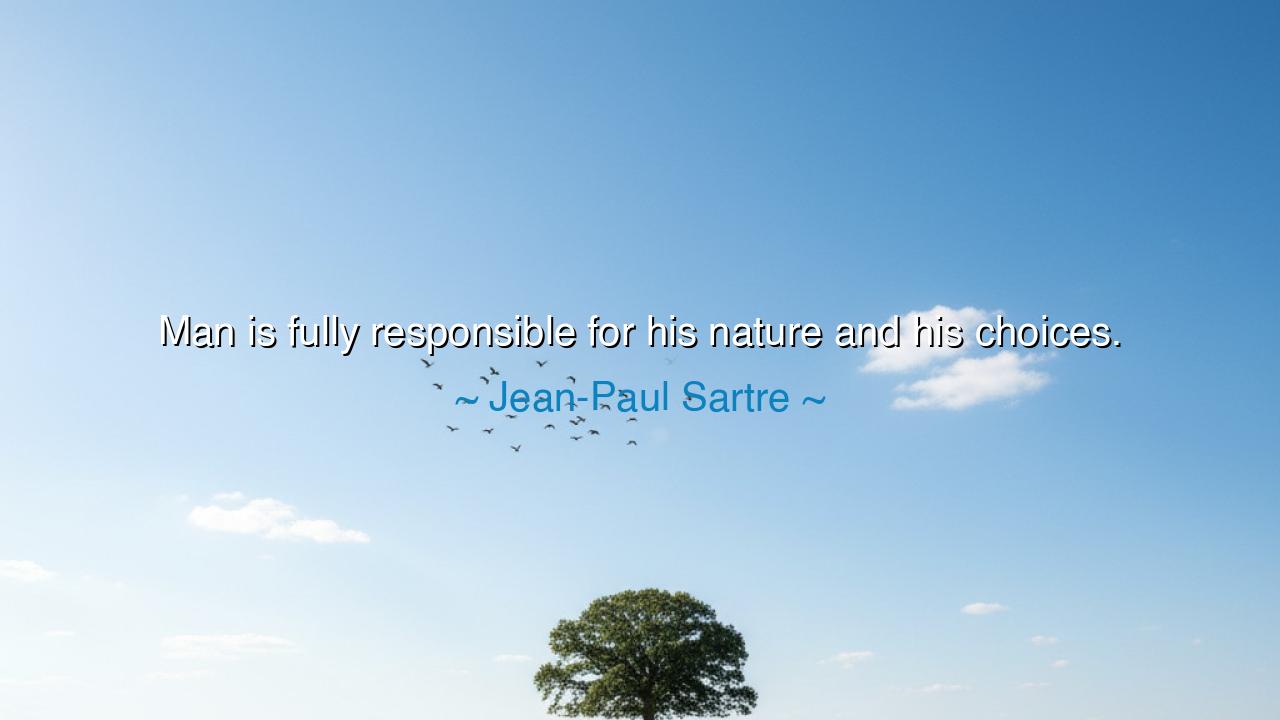
Man is fully responsible for his nature and his choices.






“Man is fully responsible for his nature and his choices.” Thus declared Jean-Paul Sartre, the philosopher of freedom, whose words cut like a blade through the fog of excuses and self-deception. In this brief sentence he delivers a truth that both terrifies and liberates: that no god, no fate, no circumstance can absolve us of the weight of our decisions. We are authors of our own being, sculptors of our own destiny, and with this power comes a responsibility from which there is no escape.
The meaning of Sartre’s declaration is anchored in the heart of existentialism. He denies that human beings are defined by essence given before birth; instead, he insists that man is what he chooses to become. Each action, each word, each decision writes upon the canvas of our lives. To say that we are “fully responsible” is to strip away the crutches of blame. One cannot point to heritage, to society, or to circumstance alone. While these shape the stage, the role is chosen by the actor. Thus, our nature itself—our character, our habits, our very being—is forged not by fate but by the choices we make.
History offers us luminous examples of this truth. Consider Viktor Frankl, survivor of the Nazi concentration camps. Surrounded by cruelty, stripped of freedom, family, and home, he nevertheless discovered that one freedom could never be taken from him: the freedom to choose his response. In the midst of horror, he chose dignity, meaning, and hope. He emerged not only alive but transformed, teaching the world that even in chains, man is responsible for himself. Frankl’s testimony proves Sartre’s words: our choices define us, even in the darkest hour.
The origin of Sartre’s insight lies in the aftermath of war, in an age when humanity had witnessed the devastation wrought by blind obedience and denial of responsibility. Too many had claimed, “I was only following orders.” Sartre’s philosophy rose as a rebuke: such excuses cannot erase responsibility. Every man and woman, regardless of circumstance, is accountable for the choices they make. By insisting that “man is fully responsible,” Sartre shattered illusions of escape and demanded a fierce honesty about our lives.
There is a heroic power in this teaching, but also a heavy burden. For to accept responsibility is to abandon the comfort of blaming destiny. It means admitting that cowardice and cruelty are not forced upon us, but chosen; that greatness and nobility are not granted by birth, but earned. This responsibility can frighten, for it leaves us naked before the weight of our freedom. Yet it can also inspire, for it means that no matter where we stand today, we may choose again tomorrow. Our chains are often of our own making, and so too are the keys.
The lesson for us is urgent: do not flee from the responsibility of your freedom. If you stumble, admit it, and choose anew. If you fail, do not hide behind excuses, but learn, and shape yourself again. Recognize that every day you are crafting your nature, not passively but actively, with every choice you make—whether in honesty or deceit, in courage or cowardice, in love or indifference.
Therefore, dear listener, engrave Sartre’s wisdom upon your heart. Live each day knowing that you are the author of your life’s story. Accept responsibility for your choices, and in doing so, accept your full humanity. Do not tremble before this burden—embrace it. For it is in this responsibility that true freedom is found, and in true freedom that the greatness of the human spirit reveals itself.






AAdministratorAdministrator
Welcome, honored guests. Please leave a comment, we will respond soon